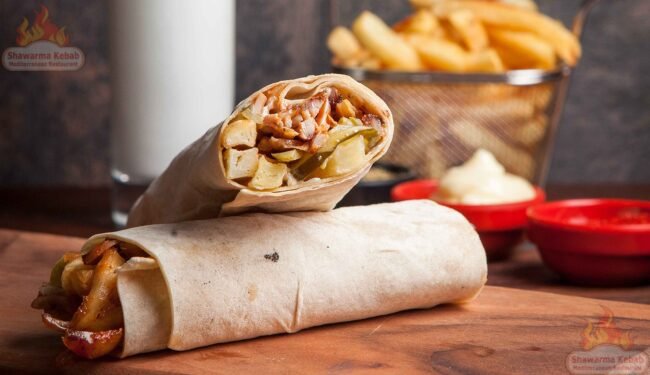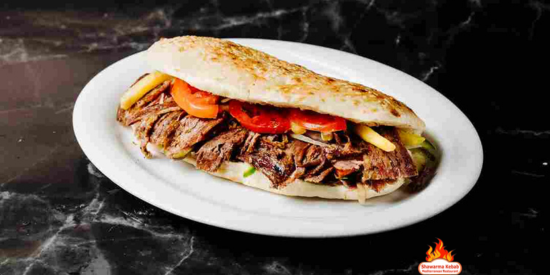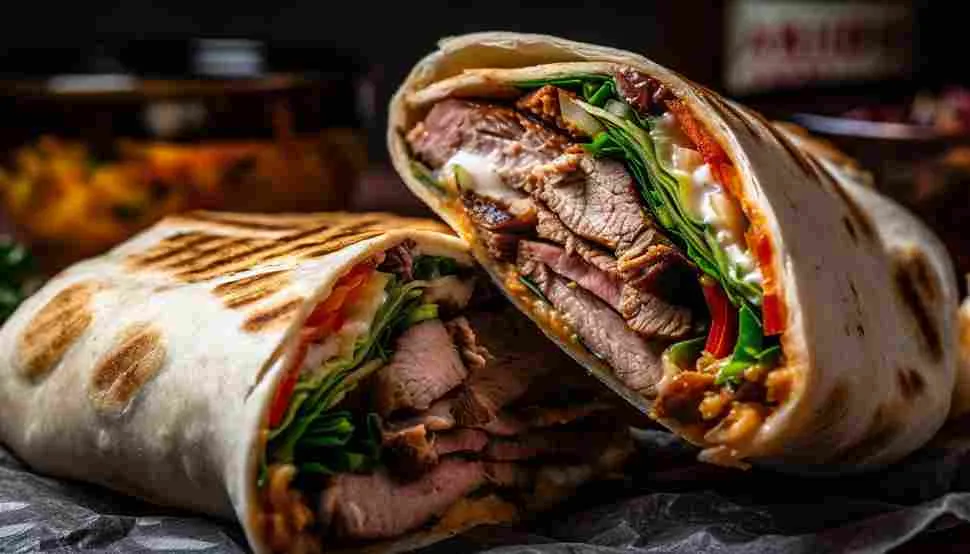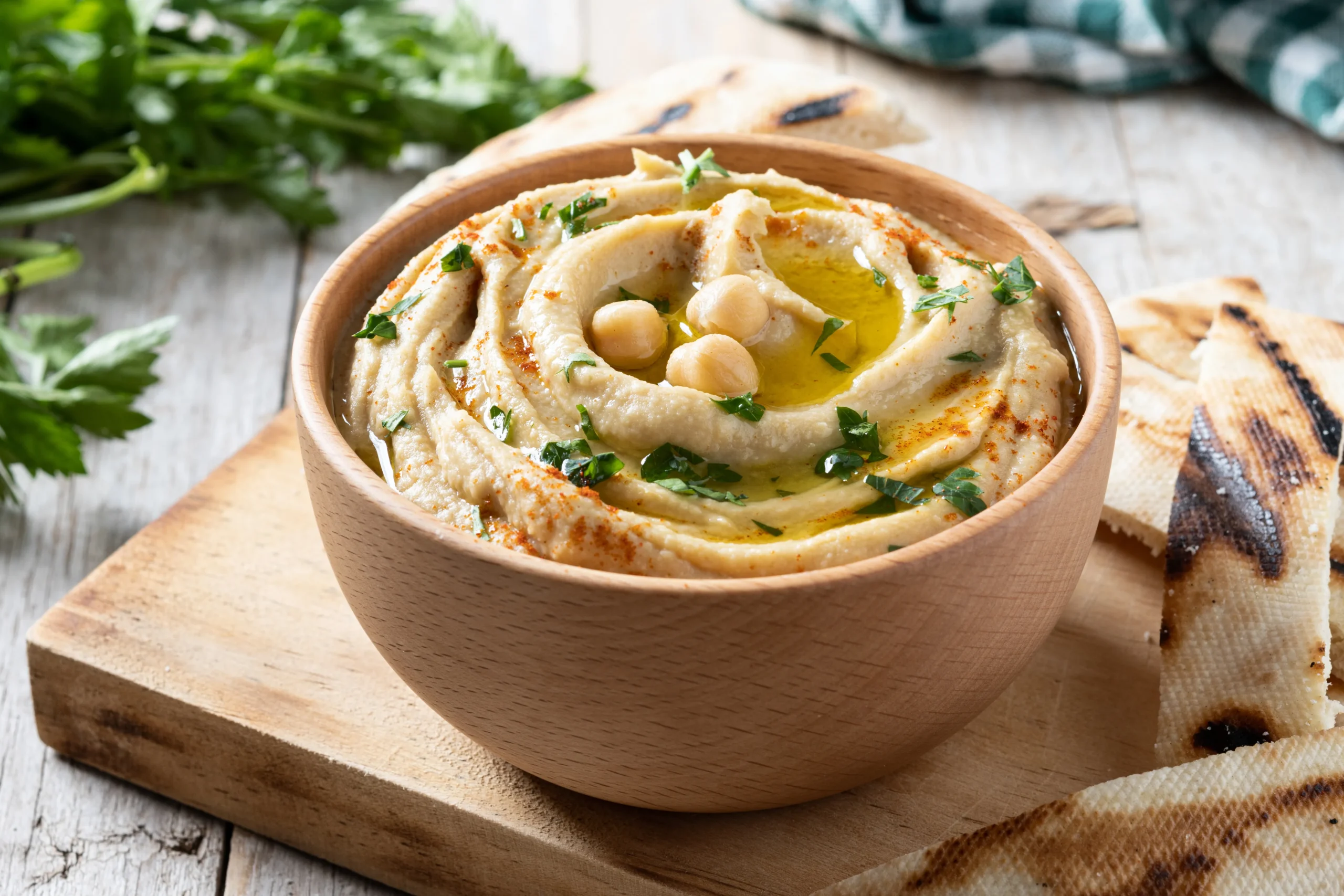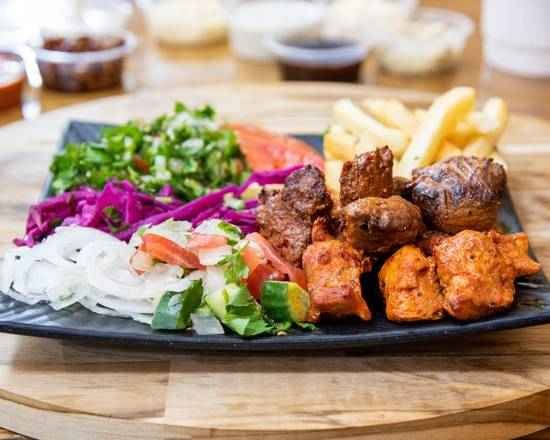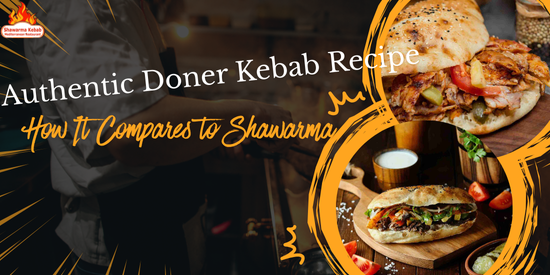The Mediterranean diet has been famous for its health, flavor, and versatility for centuries. When it comes to Mediterranean cuisine, the focus is usually on fresh vegetables, nutritious fats, and lean protein. One of its highlights is the way they cook meat in a way that is both halal and healthy. With savory kebabs and flavorful beef shawarma, Mediterranean meat cooking is one of the finest examples of how diet and taste can peacefully coexist with dietary laws.
Halal meat preparation assures the food is compliant with Islamic dietary laws, and the Mediterranean approach is focused on natural ingredients, a balanced diet, and rich flavor. Blending these concepts creates dishes that are not only delicious but also aligned with a healthy lifestyle. In this article, we will cover what makes Mediterranean meat prep so special, how you can enjoy it in restaurants or at home, and offer some practical recipes and tips.
Understanding Mediterranean Cuisine
Mediterranean cuisine is the cuisine of the countries bordering the Mediterranean Sea, including Greece, Turkey, Lebanon, Israel, Morocco, and parts of Italy and Spain. It is characterized by a dependence on fresh, whole foods like vegetables, fruits, nuts, legumes, olive oil, herbs, and spices.
In addition to plant foods, protein is a mainstay of the Mediterranean diet. Lean meats, poultry, and fish are preferred, traditionally prepared using minimal amounts of oil or grilling methods that seal in flavor and nutrition. This style of cuisine naturally fits within halal guidelines because it emphasizes clean, ethically raised foods.
Mediterranean recipe dishes are healthy and flavorful. Made with olive oil, garlic, lemon juice, and aromatic herbs, the dishes are rich without relying on excessive fat or sugar. When meat is prepared this way, not only is it wonderful to consume, but it also provides a balanced source of protein that your body requires to remain healthy.

What Makes Mediterranean Meat Preparation Unique
Mediterranean meat preparation differs from other types of cuisine primarily because it has a distinctive combination of lean proteins, natural marinades, and grilling techniques. Compared to fried or breaded meats, Mediterranean shawarma, kebabs, and roasted meats are all prepared in ways that seal in flavor without adding extra calories.
One of the more significant elements is the marinade. Mediterranean marinades customarily incorporate olive oil, lemon juice, garlic, yogurt, and fresh herbs. These soften the meat while infusing flavor into it. Unlike processed sauces or sugar-heavy marinades used in other cuisines, Mediterranean marinades are clean, healthy, and simple.
Grilling is another signature style. Whether eating out at a restaurant or preparing at home, grilling enables the meat to retain its natural juices while adding a smoky taste to it. It also reduces the fat content compared to frying, thereby being suitable for those on health-conscious diets.
Halal Meat in Mediterranean Cuisine
Halal meat is prepared according to some Islamic dietary laws. The animals are slaughtered humanely, and certain meats, such as pork, are prohibited. The combination of halal practices and Mediterranean cuisine creates dishes that are both healthy and ethical.
For example, a recipe of Mediterranean beef shawarma prepared with halal beef ensures diners protein that aligns with dietary needs without any loss to the traditional flavors of the region. Chicken kebabs or lamb chops prepared in a halal-friendly manner also keep both health and faith intact.
This fusion of Mediterranean and halal traditions demonstrates that ethical meats do not have to sacrifice either taste or creativity. The use of citrus, spices, and herbs in marinades preserves the natural flavor of the meat while ensuring that it continues to meet healthy dietary standards.
Popular Mediterranean Meat Dishes
Mediterranean kebab, shawarma, lamb chops, and meat pastries like kebbeh are some of the most popular Mediterranean meat dishes. They are not only appreciated for their taste, versatility, and nutrition but are also very popular.
Mediterranean kebabs generally consist of marinated meat threaded and grilled on high heat. They are commonly served with fresh veggies, rice, or flatbreads. The lean protein and vegetable mix makes for a satisfying but balanced meal that can be had for dinner or lunch.
Another staple is beef shawarma. Thinly sliced meat is marinated in a mixture of yogurt, lemon juice, and spices, and stacked and roasted on a vertical rotisserie. The result is tender meat that can be juicy and can be served with salads, pickles, or wraps. A simple Mediterranean beef recipe can replicate the flavor of a shawarma plate with very little kitchen hardware for a homemade version.
Lamb, chicken, and fish are also Mediterranean staples when it comes to meat. All three proteins are typically paired with herbs, garlic, and citrus for the best flavor. The emphasis on natural ingredients makes for both healthy and halal meals.
Health Benefits of Mediterranean Meat
One of the reasons Mediterranean meat preparation is unique is its emphasis on health. Meats that are grilled or roasted help retain nutrients without the unnecessary fat, and olive oil- and herb-heavy marinades add antioxidants and healthy fats.
The protein-rich content aids in muscle growth and maintenance, and the modest consumption of fat through olive oil and nuts promotes cardiovascular well-being.
Furthermore, the addition of fresh vegetables with meat gives fiber, vitamins, and minerals to every meal, which makes it nutrient-dense.
With the inclusion of Mediterranean meat in a healthy diet, one can have a meal that is hunger-satisfying, maintains energy levels, and is compatible with a healthy lifestyle in the long run.
Easy Mediterranean Recipes to Make at Home
Making Mediterranean meat at home can be easy and rewarding. Using a few easy recipes, you can make restaurant-quality food without fuss.
For example, Mediterranean beef shawarma is made by marinating thin strips of beef in yogurt, garlic, lemon, cumin, and paprika. Let the meat rest for a few hours before pan-searing or grilling. Serve with a side of fresh salad and whole-grain pita for a complete meal.
A second simple choice is Mediterranean kebabs. Mix pieces of chicken, lamb, or beef with olive oil, garlic, rosemary, and thyme. Thread the meat alongside peppers, onions, and zucchini and grill until done. Not only do these skewers look great, but they are also full of nutrients and taste.
These recipes allow one to easily savor traditional Mediterranean flavors in the comfort of home while managing ingredients for health and halal compliance.
Pairing Meat with Traditional Mediterranean Sides
Mediterranean meat is traditionally served with supporting sides that assist in completing the meal. Some of the most popular are fresh salads, roasted vegetables, hummus, and tabbouleh. All these sides are naturally low in calories and rich in nutrients, so they make an ideal pairing for protein-rich foods.
For dinner, lamb chops grilled and paired with a Greek salad or a side of herb-roasted eggplant can constitute a complete and satisfying plate. The combination of protein, healthy fats, and fiber fills the belly while delivering essential nutrients.
Even the condiments like garlic yogurt sauce or tzatziki add flavor without taking away from the health. It is a side like these that makes Mediterranean meals easy to translate to both casual and formal dining.
Spices and Herbs: The Secret to Flavor
The hallmark of Mediterranean meat is the seasoning. Fresh herbs and spices turn ordinary protein into the sublime. Garlic, rosemary, thyme, oregano, cumin, coriander, and paprika are some that are used liberally throughout Mediterranean cuisine.
They do more than just add flavor. Most herbs have antioxidants and anti-inflammatory properties that foster overall well-being. By emphasizing herbs and spices instead of rich sauces, Mediterranean meat is light, flavorful, and in accordance with healthful eating.
Even a simple rub of olive oil, garlic powder, and paprika can make a cut of lamb or beef into a tasty, fragrant dinner. This also allows the meat’s natural flavors to dominate.
Exploring Regional Variations in Mediterranean Meat
Mediterranean meats vary significantly by region, each with its own set of flavors and techniques. In Greece, beef and lamb are often marinated in olive oil, garlic, and oregano, and grilled on souvlaki or skewered kebabs. Chicken and beef shawarma are marinated in a mixture of yogurt, lemon juice, and aromatic spices like cumin and paprika in Lebanon, which gives them a pungent aroma and makes them tender.
Turkey has kofte, a spiced meatball made of ground lamb or beef mixed with onions, herbs, and spices. These variations allow diners to experience a range of flavor profiles while staying true to Mediterranean cooking ideals.
Tips for Ordering Healthy Mediterranean Meat Options
When ordering Mediterranean meats, both taste and health should be kept in mind. Opt for meats that are grilled, roasted, or baked rather than fried to prevent unhealthy fats. Avoid heavy cream-based sauces or sweet marinades and instead choose dishes seasoned with olive oil, herbs, and citrus.
Pairing your protein with raw vegetables or a side salad increases the fiber content, making the meal complete. Choosing lean meats such as chicken breast, lean beef, or fish also maintains the calorie count low while helping to ensure the dish is satisfying and nutritious.
Mediterranean Meat for Dinner: Quick Tips
- When cooking Mediterranean meat for dinner, the focus should be simplicity, quality, and balance. Go for lean, halal protein, marinate in olive oil and fresh herbs, and serve alongside vegetables or whole grains.
- Grilling or roasting is also preferable to frying. This technique locks in juices and flavor without adding unnecessary fat.
- Consider making a batch of easy Mediterranean beef recipes to have on hand for a number of meals. Meal prep like this is a time-saver and ensures that you can have healthy, delicious dinners available all week.
FAQs
What meats are Mediterranean?
Mediterranean cuisine comprises a variety of meats, including beef, lamb, chicken, fish, and sometimes goat. The meats are most often grilled, roasted, or stewed in herbs and spices.
What are Mediterranean foods?
Some of them are grilled kebabs, skewers of shawarma with beef, lamb chops, Greek salad, hummus, tabbouleh, stuffed grape leaves, and seafood. Most dishes emphasize fresh vegetables, olive oil, and whole grains.
What is a Mediterranean marinade?
A Mediterranean marinade typically contains olive oil, lemon juice, garlic, yogurt, and herbs such as oregano, thyme, rosemary, and parsley. Some of the spices that are typically added for extra flavor include paprika, cumin, and coriander.
Is Mediterranean meat healthy?
Yes. Mediterranean meat prepared using lean cuts of meat, olive oil, and fresh herbs is nutritionally rich, protein-dense, and lower in unhealthy fat compared to fried or highly processed meat.
Can I make Mediterranean beef shawarma at home?
Yes, by all means. Use thinly sliced beef, yogurt, garlic, lemon juice, and spices. Marinate for a few hours, then grill or pan-fry. Serve in a fresh salad, herbs, and optional whole-grain pita.
What’s the difference between Mediterranean kebabs and shawarma?
Kebabs are generally skewered meat cooked over an open fire, whereas shawarma is thinly sliced meat piled and roasted vertically. Both are tasty, though, with different presentations and cooking methods.
Conclusion
Mediterranean meat cuisine combines the best in taste, nutrition, and halal dietary laws. From succulent Mediterranean kebabs to flavorful beef shawarma, Mediterranean cuisine is all about fresh foods, good, balanced nutrition, and vibrant spices. Whether you are dining out or cooking a meal at home, Mediterranean foods allow you to enjoy rich, fulfilling meals without compromising nutrition.
With its emphasis on lean meats, natural marinades, and fresh accompaniments, Mediterranean cooking is both delicious and healthy. It’s simple, versatile, and perfect for anyone seeking flavorful dishes that encourage a healthy way of life. By embracing these traditions, you can enjoy authentic, fragrant dishes while staying true to halal and health-conscious values.
At Shawarma Kebab Restaurant, all their dishes are prepared with care and regard for quality. Their delicious food, like properly grilled kebabs and flavorful shawarma, makes people crave more. Shawarma Kebab Restaurant offers a variety of meals, from dine-in to takeout, that satisfy cravings without sacrificing freshness and taste.


